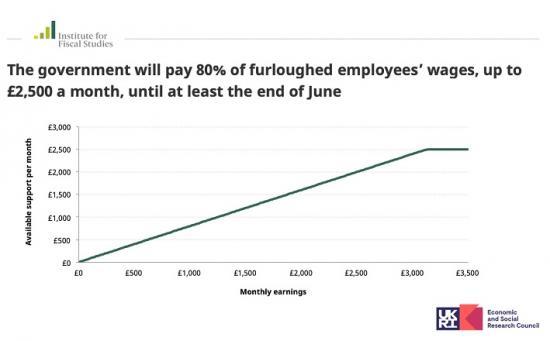Chancellor's huge package of support could cost several billion pounds per month
21st March 2020

From the Institute for Fiscal Studies.
A response to the Chancellor's new package of support.
The Chancellor has announced a huge package of support aimed at keeping people in employment.
The Chancellor, Rishi Sunak, has today announced a substantial package of support that will incentivise employers to keep hold of their employees over the next few months and a significant boost to the incomes of those reliant on Universal Credit.
For at least until the end of June the Government will pay 80%, up to £2,500 per month, the wages of those who have been furloughed. In many cases employers will choose to do this - and pay the remaining 20% of wages - rather than lay off the employee. Protecting jobs at this time is a clear priority and this measure should help individuals through the period before hopefully something like normality is restored in the economy. The chart below shows how substantial the support will be for employees of different earnings levels.
There are some wrinkles in the policy. Depending on the details it might turn out to be extremely generous to those who work for their own companies. Some employers might find it frustrating that it rewards them for having half of their workforce not working at all when they would much rather have all of their workforce working half-time. It will discourage employees from moving to job opportunities that will be opening up, including in areas where the virus outbreak has increased demand for workers. And this policy does not help the self-employed who, overall, gain relatively little support from today's announcement.
The other significant group of winners comes from Mr Sunak's decision to increase the standard annual allowance in Universal Credit by £1,000 for one year. This, and associated changes, will increase the entitlements of 4 million recipients at a cost of £4 billion. The boost to incomes will be particularly large for those on the lowest incomes: for a single childless adult aged over 25 who has no income will see an increase in their basic benefit from £73.34 per week to £92.57 per week. This really is substantial. There was also an increase in housing benefit that will particularly help private sector tenants in many parts of the country where rents have increased particularly quickly since 2012 such as Cambridge and areas around London.
Supporting individuals through this period, and trying to ensure that when the Covid-19 outbreak has passed that employees are still in their jobs, is rightly the focus of policy action. But even if the health costs of the virus were to prove shortlived the financial costs of this crisis will be felt for many many years to come as government debt will be substantially elevated.
IFS Director Paul Johnson said:
"The Chancellor has announced a huge package of support aimed at keeping people in employment. The cost of the wage subsidy package is unknowable at present but will run into several billion pounds per month that it is in operation. Suppose 10% of employees are affected. That could cost the government in the order of £10 billion over three months. If more take advantage of the support then the cost will be proportionally higher.
It is clearly a policy designed in haste and will require considerable speed and flexibility from HMRC to deliver. As a result there are obvious concerns about its design. An employer with 10 employees might have enough work to keep them all occupied half time. This policy gives a very clear incentive to furlough half of them and keep half of them on full time. There may also be concerns about policing this especially for owner managed companies paying wages to the owner.
Increasing the standard annual allowance in Universal Credit by £1,000 for one year, and associated changes, will benefit 4 million current recipients at a cost of £4 billion, and will help many who do lose their job. A single childless adult aged over 25 who has no other income will see an increase in their basic benefit from £73.34 per week to £92.57 per week.
The increase in housing benefit rates will particularly help private sector tenants in parts of the country where rents have increased quickly since 2012 - areas such as Cambridge and areas around London for example. Someone renting a three bed house in Cambridge for example will see their maximum benefit rise by more than £37 a week.
It remains the case that the government is still struggling to find effective ways to support the self-employed."
IFS web site www.ifs.org.uk
